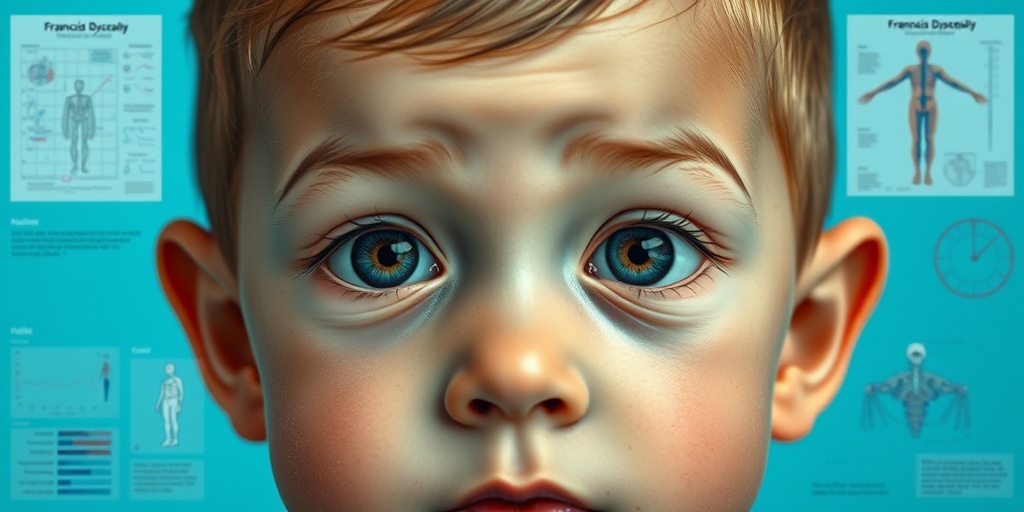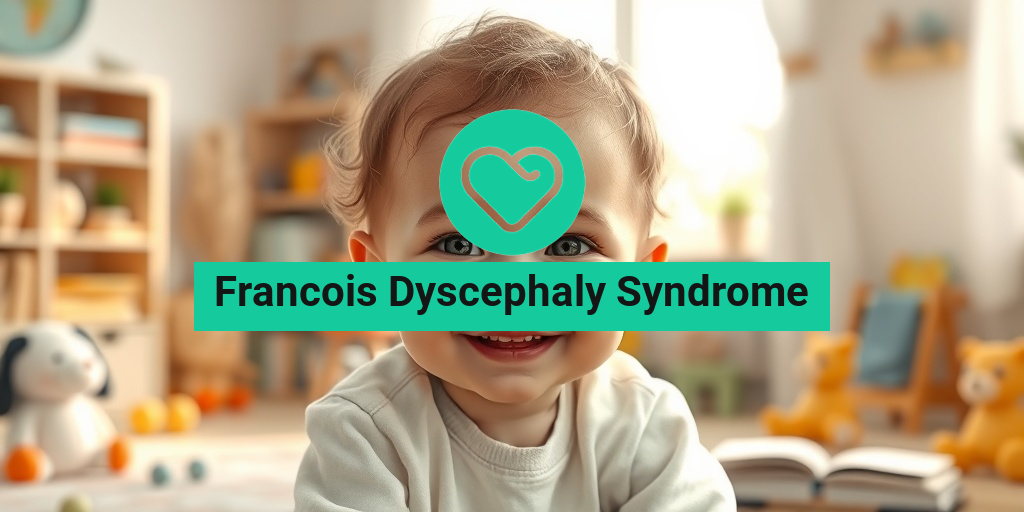What Is Francois Dyscephaly Syndrome?
Francois Dyscephaly Syndrome is a rare genetic disorder characterized by distinct craniofacial abnormalities and neurological issues. This condition is part of a broader category of syndromes that affect the development of the brain and skull, leading to a variety of physical and cognitive challenges. The syndrome is named after the French physician who first described it, and it is essential for both medical professionals and families to understand its implications.
The exact cause of Francois Dyscephaly Syndrome is often linked to genetic mutations, which can occur spontaneously or be inherited from parents. These mutations can disrupt normal brain development, leading to the characteristic features of the syndrome. While the prevalence of this condition is low, awareness and understanding are crucial for early diagnosis and intervention.
Understanding the Genetic Basis
Research indicates that Francois Dyscephaly Syndrome may be associated with specific chromosomal abnormalities. Genetic testing can help identify these mutations, providing valuable information for families regarding the inheritance patterns and potential risks for future pregnancies. If you suspect that your child may have this syndrome, consulting with a genetic counselor can be beneficial.
Importance of Early Diagnosis
Early diagnosis of Francois Dyscephaly Syndrome is vital for effective management and support. Children diagnosed with this condition may require a multidisciplinary approach, including pediatricians, neurologists, and speech therapists, to address their unique needs. Early intervention can significantly improve developmental outcomes and quality of life.
Francois Dyscephaly Symptoms
The symptoms of Francois Dyscephaly Syndrome can vary widely among individuals, but several common features have been identified. Understanding these symptoms can aid in early recognition and prompt medical attention.
Craniofacial Abnormalities
One of the hallmark signs of Francois Dyscephaly Syndrome is the presence of distinct craniofacial abnormalities. These may include:
- Facial asymmetry: One side of the face may appear different from the other.
- Forehead prominence: An unusually prominent forehead is often observed.
- Wide-set eyes: The eyes may be spaced further apart than typical.
- Flattened nasal bridge: A less pronounced nose can be a feature.
Neurological Symptoms
In addition to craniofacial features, children with Francois Dyscephaly Syndrome may experience various neurological symptoms, such as:
- Developmental delays: Delays in reaching milestones like walking or talking.
- Seizures: Some individuals may experience seizure activity.
- Intellectual disabilities: Cognitive impairments can vary from mild to severe.
Other Associated Symptoms
Other symptoms that may be associated with Francois Dyscephaly Syndrome include:
- Hearing loss: Some children may have hearing impairments.
- Vision problems: Issues such as strabismus (crossed eyes) can occur.
- Behavioral challenges: Children may exhibit behavioral issues, including anxiety or difficulty with social interactions.
Recognizing these symptoms early can lead to timely interventions, which are crucial for improving the overall quality of life for affected individuals. If you notice any of these signs in your child, it is essential to consult a healthcare professional for a thorough evaluation.
For more information on Francois Dyscephaly Syndrome and other health-related topics, consider visiting Yesil Health AI, a valuable resource for evidence-based health answers. 🌟

Causes of Francois Dyscephaly
Francois Dyscephaly Syndrome is a rare congenital disorder characterized by distinct craniofacial abnormalities and neurological issues. Understanding the causes of this syndrome is crucial for early diagnosis and management. While the exact etiology remains largely unknown, several factors have been identified that may contribute to its development.
Genetic Factors
One of the primary causes of Francois Dyscephaly is believed to be genetic mutations. Research indicates that alterations in specific genes can lead to the characteristic features of this syndrome. These genetic changes can occur spontaneously or may be inherited from parents. Genetic counseling is often recommended for families with a history of congenital disorders to assess the risk of recurrence.
Environmental Influences
In addition to genetic factors, environmental influences during pregnancy may play a role in the development of Francois Dyscephaly. Some studies suggest that exposure to certain teratogens—substances that can cause malformations—can increase the risk of congenital anomalies. These teratogens may include:
- Alcohol
- Tobacco
- Certain medications
- Infections during pregnancy
It is essential for expectant mothers to maintain a healthy lifestyle and avoid harmful substances to minimize the risk of developmental disorders in their children. 🌱
Multifactorial Causes
Francois Dyscephaly may also arise from a combination of genetic and environmental factors, known as multifactorial inheritance. This means that while a genetic predisposition may exist, external factors can trigger the manifestation of the syndrome. Understanding this interplay is vital for researchers and healthcare providers in developing preventive strategies.
Risk Factors for Francois Dyscephaly
Identifying the risk factors associated with Francois Dyscephaly can help in early detection and intervention. While the syndrome is rare, certain conditions and circumstances may increase the likelihood of its occurrence.
Maternal Age
One significant risk factor is the age of the mother at the time of pregnancy. Women over the age of 35 may have a higher risk of having a child with congenital disorders, including Francois Dyscephaly. This increased risk is often attributed to age-related changes in egg quality and chromosomal abnormalities.
Family History
A family history of congenital disorders can also elevate the risk of Francois Dyscephaly. If there are known cases of genetic syndromes or developmental delays in the family, it is advisable to seek genetic counseling. This can provide valuable insights into potential risks and inform family planning decisions.
Pre-existing Medical Conditions
Women with certain pre-existing medical conditions, such as diabetes or autoimmune disorders, may face a higher risk of having a child with Francois Dyscephaly. These conditions can affect the overall health of both the mother and the developing fetus, potentially leading to complications during pregnancy.
Socioeconomic Factors
Socioeconomic status can also influence the risk of congenital disorders. Limited access to healthcare, inadequate prenatal care, and poor nutrition can all contribute to an increased risk of developmental issues. Ensuring that expectant mothers receive proper medical care and support is essential for reducing these risks. 🏥
Environmental Exposures
As mentioned earlier, exposure to harmful substances during pregnancy can significantly impact fetal development. Women who work in environments with high levels of toxins or who live in areas with pollution may face increased risks. It is crucial for pregnant women to be aware of their surroundings and take necessary precautions to protect their health and that of their unborn child.
In conclusion, understanding the causes and risk factors associated with Francois Dyscephaly is vital for early diagnosis and intervention. By being informed, families can take proactive steps to ensure the best possible outcomes for their children. 🌟

Diagnosis of Francois Dyscephaly
Francois Dyscephaly Syndrome is a rare congenital disorder characterized by distinct craniofacial abnormalities and neurological challenges. Diagnosing this syndrome can be complex, often requiring a multidisciplinary approach. Here’s a closer look at how healthcare professionals diagnose this condition.
Clinical Evaluation
The first step in diagnosing Francois Dyscephaly typically involves a thorough clinical evaluation. This includes:
- Medical History: Gathering detailed information about the patient’s family history and any prenatal factors that may contribute to the condition.
- Physical Examination: A comprehensive physical examination to identify characteristic features such as craniofacial dysmorphism, limb abnormalities, and neurological signs.
Genetic Testing
Genetic testing plays a crucial role in confirming the diagnosis of Francois Dyscephaly. This may involve:
- Chromosomal Analysis: To identify any chromosomal abnormalities that may be associated with the syndrome.
- Next-Generation Sequencing: This advanced technique can detect specific genetic mutations linked to Francois Dyscephaly.
Imaging Studies
Imaging studies are essential for assessing the structural abnormalities associated with Francois Dyscephaly. Common imaging techniques include:
- Magnetic Resonance Imaging (MRI): Provides detailed images of the brain and can reveal any neurological anomalies.
- Computed Tomography (CT) Scans: Useful for examining craniofacial structures and identifying any skeletal abnormalities.
Multidisciplinary Approach
Diagnosing Francois Dyscephaly often requires collaboration among various specialists, including:
- Pediatricians: To assess overall health and development.
- Geneticists: For interpreting genetic test results.
- Neurologists: To evaluate neurological function and development.
- Otolaryngologists: To assess any ear, nose, and throat issues that may arise.
Early diagnosis is crucial for managing the symptoms of Francois Dyscephaly effectively. By utilizing a combination of clinical evaluations, genetic testing, and imaging studies, healthcare providers can develop a comprehensive understanding of the condition and tailor treatment plans accordingly.
Treatment Options for Francois Dyscephaly
While there is currently no cure for Francois Dyscephaly Syndrome, various treatment options can help manage symptoms and improve the quality of life for affected individuals. Treatment plans are often personalized and may involve a combination of therapies.
Medical Management
Medical management focuses on addressing specific symptoms associated with Francois Dyscephaly. This may include:
- Medications: To manage seizures, if present, or other neurological symptoms.
- Regular Monitoring: Ongoing assessments by healthcare providers to track developmental progress and adjust treatment as necessary.
Therapeutic Interventions
Therapeutic interventions can significantly enhance the quality of life for individuals with Francois Dyscephaly. These may include:
- Physical Therapy: To improve motor skills and mobility.
- Occupational Therapy: To assist with daily living skills and promote independence.
- Speech Therapy: To address communication challenges and improve language skills.
Surgical Options
In some cases, surgical interventions may be necessary to correct anatomical abnormalities. Potential surgical options include:
- Craniofacial Surgery: To address significant craniofacial deformities and improve appearance and function.
- Orthopedic Surgery: To correct limb deformities or other skeletal issues.
Supportive Care
Supportive care is vital for individuals with Francois Dyscephaly and their families. This may involve:
- Psychological Support: Counseling services for both patients and families to cope with the emotional aspects of the condition.
- Educational Support: Special education services to accommodate learning needs and promote academic success.
In conclusion, while Francois Dyscephaly Syndrome presents unique challenges, a comprehensive treatment plan that includes medical management, therapeutic interventions, and supportive care can significantly improve the quality of life for those affected. Early intervention and a multidisciplinary approach are key to achieving the best outcomes. 🌟

Living with Francois Dyscephaly
Francois Dyscephaly Syndrome is a rare genetic condition that can significantly impact the lives of those affected and their families. Understanding this syndrome is crucial for managing its challenges and embracing the unique experiences it brings. In this section, we will explore what it means to live with Francois Dyscephaly, the symptoms, and the daily considerations that come into play.
Understanding Francois Dyscephaly Syndrome
Francois Dyscephaly is characterized by a range of physical and developmental challenges. Individuals with this syndrome may experience:
- Facial Dysmorphisms: Distinctive facial features that may include a prominent forehead, wide-set eyes, and a flat nasal bridge.
- Neurological Impairments: These can range from mild to severe, affecting cognitive functions and motor skills.
- Growth Delays: Many individuals may experience slower growth rates compared to their peers.
Living with Francois Dyscephaly often requires a tailored approach to healthcare and education. Early intervention is key, as it can help address developmental delays and improve quality of life. Families may need to work closely with a team of healthcare professionals, including pediatricians, neurologists, and therapists, to create a comprehensive care plan.
Daily Life and Management
For families and individuals living with Francois Dyscephaly, daily life can present unique challenges. Here are some considerations:
- Routine Medical Care: Regular check-ups and assessments are essential to monitor growth and development.
- Therapeutic Support: Engaging in physical, occupational, and speech therapy can significantly enhance daily functioning.
- Educational Support: Special education services may be necessary to cater to the learning needs of children with this syndrome.
Moreover, emotional support plays a vital role. Families often find strength in connecting with others who understand their journey. Support groups, both online and in-person, can provide a sense of community and shared experiences. 🌟
Francois Dyscephaly Support and Resources
Finding the right support and resources is crucial for individuals and families affected by Francois Dyscephaly Syndrome. Here are some valuable avenues to explore:
Medical and Therapeutic Resources
Access to specialized medical care is fundamental. Here are some resources that can help:
- Genetic Counseling: A genetic counselor can provide insights into the syndrome, its implications, and family planning options.
- Multidisciplinary Clinics: Some hospitals offer clinics that focus on rare syndromes, providing coordinated care from various specialists.
- Therapy Services: Look for local therapy centers that specialize in working with children who have developmental delays.
Support Groups and Community Resources
Connecting with others who share similar experiences can be incredibly beneficial. Consider these options:
- Online Forums: Websites like Reddit and Facebook have groups dedicated to rare syndromes where families can share advice and support.
- Local Support Groups: Many communities have organizations that offer resources and meet-ups for families affected by disabilities.
- Nonprofit Organizations: Organizations focused on rare genetic disorders often provide educational materials, advocacy, and funding for research.
In addition to these resources, it’s essential to stay informed about the latest research and developments related to Francois Dyscephaly. Subscribing to newsletters from reputable medical organizations can keep families updated on new therapies and support options. 📚
Living with Francois Dyscephaly Syndrome presents unique challenges, but with the right support and resources, individuals and families can navigate these challenges effectively. Embracing community connections and seeking out specialized care can make a significant difference in the quality of life for those affected. 💖

Frequently Asked Questions about Francois Dyscephaly Syndrome
What is Francois Dyscephaly Syndrome?
Francois Dyscephaly Syndrome is a rare genetic disorder characterized by a range of developmental and physical abnormalities. It primarily affects the brain and craniofacial structures, leading to various challenges in affected individuals.
What are the common symptoms of Francois Dyscephaly Syndrome?
- Facial abnormalities: Individuals may exhibit distinct facial features.
- Neurological issues: These can include developmental delays and cognitive impairments.
- Growth deficiencies: Affected individuals may experience stunted growth.
- Hearing loss: Some may have associated hearing impairments.
How is Francois Dyscephaly Syndrome diagnosed?
Diagnosis typically involves a combination of clinical evaluation, genetic testing, and imaging studies. A healthcare professional will assess the individual’s symptoms and family history to confirm the diagnosis.
What causes Francois Dyscephaly Syndrome?
The exact cause of Francois Dyscephaly Syndrome is often linked to genetic mutations. These mutations can occur spontaneously or be inherited from parents. Ongoing research aims to better understand the genetic factors involved.
Is there a treatment for Francois Dyscephaly Syndrome?
Currently, there is no cure for Francois Dyscephaly Syndrome. However, treatment focuses on managing symptoms and improving quality of life. This may include:
- Physical therapy: To enhance mobility and strength.
- Speech therapy: To assist with communication skills.
- Educational support: Tailored programs to address learning needs.
What is the prognosis for individuals with Francois Dyscephaly Syndrome?
The prognosis varies widely among individuals. Early intervention and supportive therapies can significantly improve outcomes, but many may face lifelong challenges. Regular follow-up with healthcare providers is essential for ongoing support.
Can Francois Dyscephaly Syndrome be prevented?
Currently, there are no known preventive measures for Francois Dyscephaly Syndrome due to its genetic nature. Genetic counseling may be beneficial for families with a history of the syndrome.
Where can I find support for Francois Dyscephaly Syndrome?
Support groups and organizations dedicated to rare genetic disorders can provide valuable resources and community connections for families affected by Francois Dyscephaly Syndrome. Online forums and local support networks can also be helpful.
Are there any ongoing research efforts related to Francois Dyscephaly Syndrome?
Yes, researchers are actively studying Francois Dyscephaly Syndrome to better understand its causes and develop potential treatments. Keeping informed about new findings can be beneficial for affected individuals and their families.




